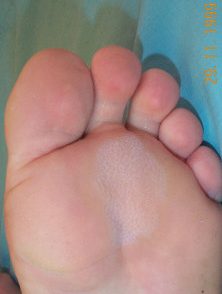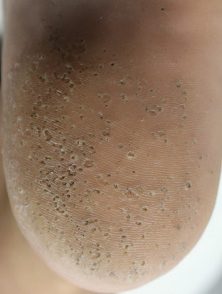The Cause of Smelly Feet.
Have you ever thought your feet were too smelly? Or you were too embarrassed to take your shoes off?
Foot Hygiene
Smelly or sweaty feet is not always a sign of bad foot hygiene. Sweat is actually odourless and is produced by your body throughout the day. It’s the bacteria that lives on your skin that combines with sweat to cause the odour.
Each foot has 250,000 sweat glands, and can produce up to 1 cup of moisture daily.
Pitted Keratolysis
One cause of smelly feet – also known as Bromhidrosis – can be from an acquired superficial bacterial infection on your feet. It is called Pitted Keratolysis. This bacteria thrives in moist conditions, like the enclosed shoes you wear all day, however it is also common in barefooted people in the tropics.
The bacteria produces an enzyme that eats little holes (pits) in the soles of your feet. The smell comes from the bacteria producing a sulfur compound. The pits are usually located in the weight bearing areas like the balls of your feet or on your heels. When your feet are wet, the pits are more pronounced.

Image: DermNet used under Creative Commons https://creativecommons.org/licenses/by-nc-nd/3.0/nz/legalcode
It is more common in men than women, mainly due to the type of work they do and the shoes they wear. However with more women moving into male dominant careers, we could see the prevalence equaling.

Image: DermNet used under Creative Commons https://creativecommons.org/licenses/by-nc-nd/3.0/nz/legalcode
Risk Factors
Generally speaking, the risk factors are:
- People who feel they are excessive sweaters and feel their socks are regularly wet after wearing.
- Wearing closed in footwear made of synthetic materials eg, rubber boots, vinyl shoes.
- Humid and hot weather
- People with diabetes
- People who are immunosuppressed
Podiatrists and GP’s would diagnose this clinically. No additional testing is usually required.
Treatment and Prevention
Treatment is simple too, have a chat with your podiatrist or GP about what solution will work best for you. It usually centres around treating the excessive sweating, and managing the bacteria with special soaps.
Prevention and ongoing treatment to stop recurrence:
- Rotate your shoes – allowing your shoes to dry out in between wear
- Avoid natural fibre socks like cotton or wool which will retain moisture. Try to wear moisture wicking socks made with synthetic materials such as acrylic or “Coolmax” Polyester.
- Change your socks throughout the day like in your lunch break.
- Wash your feet with antibacterial soap like Dettol, Sapoderm or Cetaphil Antibacterial bar.
